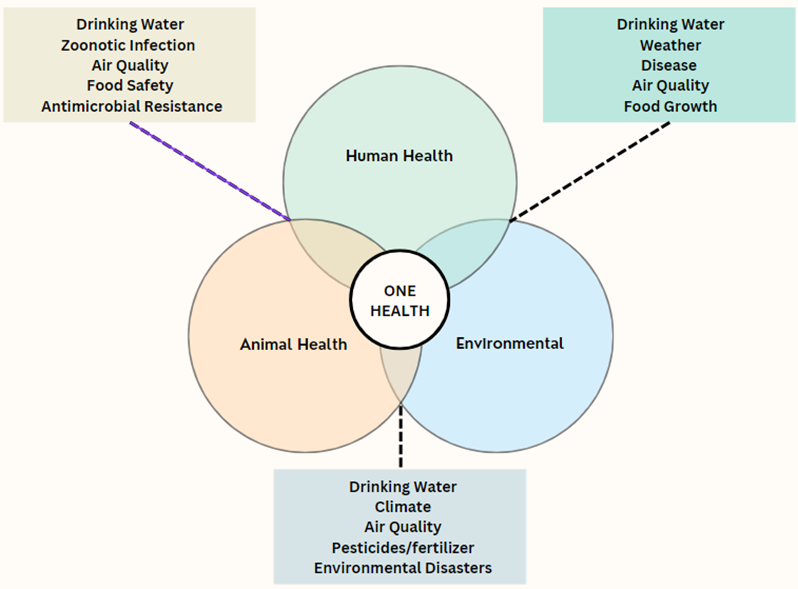The World Health Organization (WHO) defines health as “a state of complete physical, mental, and social well-being.” Historically, when we have directly applied this to animals, we have concluded that animals need basic necessities such as food/water, shelter, and a place to relieve themselves. While these things are essential, there is a significant difference between surviving and obtaining an exceptional level of health. Achieving truly healthy animals means understanding that all health is one health. The idea behind the One Health approach is to recognize that humans, animals, and the environment interact in ways that make them dependent on each other. This diagram above gives incredibly simplistic examples but is a good introductory visual of how interconnected we are with the environment and animals around us.
An important, perhaps long-winded, example of one health is to look at diseases. We have seen in recent years that pathogens that affect animals can mutate in ways that allow humans to become susceptible. Through this lens, we can entertain the idea that animal health and human health are connected. However, the circumstances that cause pathogens to mutate into a zoonotic disease are generally more associated with the environment and less so with the individual animal. Increases in average temperatures caused by climate change can start an evolutionary domino effect in which the pathogens that are surviving the strong heat will be the ones to survive and be potentially more dangerous than those who were dying off at cooler temperatures. This example can be extended into pathogens that are introduced into drinking supplies because of excess rain/flooding that creates runoff from production farms, which contains animal fecal matter.
There are numerous ways in which one health can be discussed and analyzed. Everyone will have different ideas on how to play a part in healthier animals, healthier people, and a healthier environment. As a recruiting firm that specializes in animal health, we recognize the importance of intersectionality and how skill sets from one area are applicable to others, and how diversity can be celebrated and used as a tool to advance our practices in the animal health field.
If you are currently in the animal health field or you can see yourself using your skillset to enhance the animal health industry, contact Boaz Partners’ Animal Health Recruiters Michele Baxley (Michele@BoazPertners.com) or Debbie Caldwell (Debbie@boazpartners.com).
If you’re interested in learning more about One Health or want to have a discussion on how you can contribute to better overall health, contact Boaz Partners’ Research Associate Sara Schwarzkopf (SaraS@BoazPartners.com).
Are you looking for top talent in the Specialty Chemical, Advanced Materials, or Animal Health industry?
Contact us to discuss how we can bring top leadership talent to your team. Boaz Partners is a premier executive search firm focused on the direct recruitment of executives and professionals for the specialty chemicals and animal health space. We are your partner, and our focus is on custom recruiting solutions. Follow the link to learn more about how our animal health recruiters can help you.
